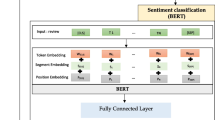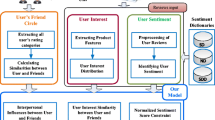Abstract
In the futuristic Industry framework, user interactions with the product are seamlessly integrated with the product life cycle which results in Information overload. The shopbots were proposed in Industry 4.0 where the more focus was on process automation. In this research work, we propose recommender system for industry 5.0 which is based on collaboration of human beings and machines with more focus on user’s personalization. Recommender system can be considered as an information filtering tool that provides suggestions to users about products, music, friend, topic, etc. This suggestion is based on the interest of users. Several research works have been carried out to improve recommendation accuracy by using matrix factorization, trust-based, hybrid-based, machine learning, and deep learning techniques. However, very few existing works have leveraged textual opinions for the recommendation to the best of our knowledge. Existing research works have focused only on numerical ratings, which do not reflect actual user behaviour. In this research work, sentiments of textual opinions are analysed for an in-depth analysis of user’s behaviour. Recommendation accuracy is improved by using the proposed score Recop which is calculated from opinion sentiments. Furthermore, the sparsity issue is resolved by using our proposed approach. Amazon and Yelp review datasets are used for Experiment analysis. Mean absolute error (MAE) and root mean square error (RMSE) values are improved significantly using the proposed approach compared to the existing approaches. MAE and RMSE scores on the Yelp dataset are 0.85 and 1.51, respectively. Additionally, MAE and RMSE scores on the Amazon dataset are 0.66 and 0.93, respectively, which clearly reflects the significant contribution of our proposed approach.









Similar content being viewed by others
Data availability
Dataset will be provided on request.
Code availability
Code will be provided on request.
References
Adomavicius G, Tuzhilin A (2005) Toward the next generation of recommender systems: a survey of the state-of-the-art and possible extensions. IEEE Trans Knowl Data Eng 17(6):734–749
Asani E, Vahdat-Nejad H, Sadri J (2021) Restaurant recommender system based on sentiment analysis. Mach Learn Appl 6:100114
Barnaghi P, Ghaffari P, Breslin J (2016) Opinion mining and sentiment polarity on twitter and correlation between events and sentiment. In: IEEE Second international conference on big data computing service and applications (BigDataService)
Bathla G, Aggarwal H, Rani R (2020) AutoTrustRec: recommender system with social trust and deep learning using autoEncoder. Multimedia Tools Appl 79(29):20845–20860
Bifet A, Frank E (2010) Sentiment knowledge discovery in twitter streaming data. Discov Sci. https://doi.org/10.1007/978-3-642-16184-1_1
Chen L, Chen G, Wang F (2015) Recommender system based on user reviews: the state of the art. UMUAI 25:99–154
Cheng Z, Chang X, Zhu L, Kanjirathinkal R, Kankanhalli M (2019) MMALFM: Explainable recommendation by leveraging reviews and images. ACM Trans Inf Syst 37(2):1–28
Da’u A, Salim N, Rabiu I, Osman A (2020a) Recommendation system exploiting aspect-based opinion mining with deep learning method. Inf Sci 512:1279–1292
Da’u A, Salim N, Rabiu I, Osman A (2020) Weighted aspect-based opinion mining using deep learning for recommender system. Exp Syst Appl 140:112871
Diao Q, Qiu M, Wu C.-Y, Smola A. J, Jiang J , Wang C (2014) Jointly modeling aspects, ratings and sentiments for movie recommendation. In: 20th ACM SIGKDD international conference on knowledge discovery and data miningKDD 14: 193–202.
Ganu G, Elhadad N, Marian A (2009) Beyond the stars: improving rating predictions using review text content. WebDB 9:1–6
Ghasemi N, Momtazi S (2021) Neural text similarity of user reviews for improving collaborative filtering recommender systems. Electron Commerce Res Appl 45:101019
Guo G, Zhang J, Yorke-Smith N(2015) TrustSVD: Collaborative filtering with both the explicit and implicit influence of user trust and of item ratings. In: Twenty-Ninth AAAI conference on artificial intelligence
Jakob N, Ag S (2009) Beyond the stars exploiting free-text user reviews. In: TSA09, pp 57–64
Koren Y, Bell R (2015) In: Recommender systems handbook, pp 145–186
Kumar A, Trueman TE, Cambria E (2021) A convolutional stacked bidirectional lstm with a multiplicative attention mechanism for aspect category and sentiment detection. Cognit Comput 1–10
Lei X, Qian X, Zhao G (2016) Rating prediction based on social sentiment from textual reviews. IEEE Trans Multimedia 18(9):1910–1921
Li W, Li X, Deng J, Wang Y, Guo J (2021) Sentiment based multi-index integrated scoring method to improve the accuracy of recommender system. Exp Syst Appl 179:115105
Ling G, Lyu M. R, King I (2014) Ratings meet reviews, a combined approach to recommend. In: Proceedings of the 8th ACM conference on recommender systems—RecSys ’14: 105–112
Liu H, He J, Wang T, Song W, Du X (2013) Combining user preferences and user opinions for accurate recommendation. Electron Commer Res Appl 12(1):14–23
Mäntylä M, Graziotin D, Kuutila M (2018) The evolution of sentiment analysis: a review of research topics, venues, and top cited papers. Comput Sci Rev 27:16–32
Musat C, Liang Y, Faltings B(2013) Recommendation using textual opinions. In: Twenty-third international joint conference on artificial intelligence
Osman NA, Noah SAM, Darwich M (2019) Contextual sentiment based recommender system to provide recommendation in the electronic products domain. Int J Mach Learn Comput 9(4):425–431
Poria S, Cambria E, Gelbukh A (2016) Aspect extraction for opinion mining with a deep convolutional neural network. Knowl-Based Syst 108:42–49
Pranckevičius T, Marcinkevičius V (2017) Comparison of naive bayes, random forest, decision tree, support vector machines, and logistic regression classifiers for text reviews classification. Baltic J Mod Comput 5(2):221
Ray B, Garain A, Sarkar R (2021) An ensemble-based hotel recommender system using sentiment analysis and aspect categorization of hotel reviews. Appl Soft Comput 98:106935
Romero CAT, Ortiz JH, Khalaf OI, Prado AR (2021) Web application commercial design for financial entities based on business intelligence. CMC-Comput Mater Continua 67(3):3177–3188
Shen R, Zhang H, Yu H, Min F (2019) Sentiment based matrix factorization with reliability for recommendation. Expert Syst Appl 135:249–258
Su X, Khoshgoftaar T (2009) A survey of collaborative filtering techniques. Adv Artif Intell. https://doi.org/10.1155/2009/421425
Sundermann C, Domingues M, Sinoara R, Marcacini R, Rezende S (2019) Using opinion mining in context-aware recommender systems: a systematic review. Information 10(2):42
Tarus J, Niu Z, Mustafa G (2018) Knowledge-based recommendation: a review of ontology-based recommender systems for e-learning. Artif Intell Rev 50(1):21–48
Tavera Romero CA, Ortiz JH, Khalaf OI, Ríos Prado A (2021) Business intelligence: business evolution after industry 4.0. Sustainability 13(18):10026
Wang Y, Liu Y, Yu X (2012) Collaborative filtering with aspect-based opinion mining: a tensor factorization approach. In: IEEE international conference on data mining
Wisesa O, Andriansyah A, Khalaf OI (2020) Prediction analysis for business to business (B2B) sales of telecommunication services using machine learning techniques. Majlesi J Electr Eng 14(4):145–153
Yang B, Lei Y, Liu J , Li W (2013) Social collaborative filtering by trust. In: Proceedings of the twenty-third international joint conference on artificial intelligence
Zhang Y, Lai G, Zhang M, Zhang Y, Liu Y , Ma S (2014) Explicit factor models for explainable recommendation based on phrase-level sentiment analysis. In: Proceedings of the 37th international ACM SIGIR conference on Research & development in information retrieval
Zhao G, Qian X, Feng H (2014) Personalized recommendation by exploring social users’ behaviors. In: International conference on multimedia modeling, pp 181–191
Funding
None.
Author information
Authors and Affiliations
Corresponding author
Ethics declarations
Conflict of interest
The authors declare that there is no conflict of interest.
Additional information
Communicated by Deepak kumar Jain.
Publisher's Note
Springer Nature remains neutral with regard to jurisdictional claims in published maps and institutional affiliations.
Rights and permissions
About this article
Cite this article
Bathla, G., Singh, P., Kumar, S. et al. Recop: fine-grained opinions and sentiments-based recommender system for industry 5.0. Soft Comput 27, 4051–4060 (2023). https://doi.org/10.1007/s00500-021-06590-8
Accepted:
Published:
Issue Date:
DOI: https://doi.org/10.1007/s00500-021-06590-8




